| Galleri Panora 22 aug – 13 sep Vernissage lör 22 aug kl 16-20 |
| Wormgod: konSEKVENS |
 konSEKVENS handlar om en händelse som utspelar sig i vår historia men som lever kvar i vårt kollektiva medvetande som ett ständigt hot. För hundra år sedan var allt annorlunda, men de flesta av oss som lever nu har på något plan alltid vetat att det närsomhelst kan ta slut. Vi har vuxit upp medvetna om vår egen dödlighet, inte som personer eller individer utan på en global nivå. konSEKVENS handlar om en händelse som utspelar sig i vår historia men som lever kvar i vårt kollektiva medvetande som ett ständigt hot. För hundra år sedan var allt annorlunda, men de flesta av oss som lever nu har på något plan alltid vetat att det närsomhelst kan ta slut. Vi har vuxit upp medvetna om vår egen dödlighet, inte som personer eller individer utan på en global nivå.
Det handlar om vapenutvecklarnas ansvarslösa kreativitet, om dem som blundar för människorna som hamnar ivägen i strävan efter makt och profit. Det är de människorna som får ta konsekvenserna. Konsekvenserna av en vapenindustri som till slut gör sig oumbärlig och självrättfärdigande. De slutgiltiga konsekvenserna av krig. Den sekvens av bilder som vi har skapat är ett försök att plocka ut ett ögonblick och sätta det i ett större sammanhang men ur lite olika perspektiv, ett försök att sätta fingret på någonting som redan existerar i medvetandet hos både betraktaren och konstnärerna. Bilderna på väggen består i sin tur av flera bilder som genom att de sätts i sekvens bildar en berättelse. En berättelse som inte är linjär utan ständig. Historien utspelar sig på en och samma gång i laboratoriet i Los Alamos, på gatorna i Hiroshima, i Vita Huset, i krigsindustrins företagsrum och på Panora i Malmö. På ett mentalt plan existerar all tid samtidigt och på ett mentalt plan lever vi alla i skuggan av svampmolnet. Wormgod är Susanne Johansson och Mattias Elftorp. Vernissage: Utställningen pågår lör 22 aug – sön 13 sep Projektet Wormgod föddes i februari 2009 som ett samarbete mellan Susanne Johansson och Mattias Elftorp, som en reaktion på en mainstreamkultur som ofta är utspädd och anpassad efter minsta gemensamma nämnare. Vi vill bearbeta tunga ämnen genom hårda uttryck. Wormgod är någonting mer än ett konstprojekt. Vi leker med både akademiska koncept och rena känslor samtidigt som det är viktigt att det finns en verklighetsförankring. Vi vill skapa den visuella motsvarigheten till musikgenrer som noise eller power electronics, någonting som är överväldigande snarare än underhållande. Vi lever i ett samhälle där schlagerfestivaler samsas med vapenexport, där övergrepp sker samtidigt som folk blundar och dricker sitt kaffe. Vi vill bryta ner gränser i ett land som alltmer stänger sina. Vi är som ett ogräs som växer upp ur en utsugningskultur maskerad som ett harmlöst konsumtionssamhälle. Arrangeras av Wormgod & Panora/Folkets Bio, i samarbete med ABF Malmö.
|
Category: Work
Piracy is Liberation 007: Spiders pt 1. Coming soon from Wormgod!
The new Piracy is Liberation book is almost finished. Just a little bit of postproduction left to do, then it’s off to the printer.
It will be out as planned in time for the Helsinki comics festival, September 12-13. And it’s just been decided that the publisher will be Wormgod, which I’m very happy with. It means keeping the book all in our own hands (me and Suss who makes the covers and is the other half of Wormgod).
Sample pages will be up at the site soon. Until then, here’s Suss’ cover:
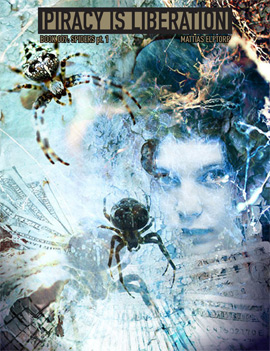
The gods are real, but most of them are dead. Pirate learns this and many more secrets from the anarchists in the desert as he gets his new assignment. Something is moving on the net. Some kind of entities seem to be interfering with its users. Are these signs of the birth of a new god, or is it something else entirely? And how does it affect the plans for the Information Upgrade that the anarchists are planning? We also get some insight into everyday religious life in the City through the surveillance cameras of a Shopping Temple…
There are also some other upcoming projects, not the least of which coming from Wormgod. Stay tuned…
Wormgod: WALL 001 in September!
The first showing of a collection of assorted prints from Wormgod, WALL 001 will be shown at a noise event at Skånes Konstförening in Malmö, starring Shift, Grunt, KOEFF, IRM and Pestdemon from Unrest Productions.
September 4.

Piracy is Liberation and the Media.
So I’ve written a bit about feminism and collectivity in the world of Piracy is Liberation now. Thought I’d talk a bit about media too.
I’d like to start by paraphrasing Frank Herbert:
Television is the mind-killer.
This may be my own personal opinion, but have you noticed how there’s never anything good on? And still you can get stuck in front of the TV screen for hours, then finally get up and turn it off and feel kind of dirty inside. Like your mind has been infected by something. TV is a media form that tends toward a kind of entertainment that is more concerned with profit than content.
Which is, of course, nothing new. Which in turn makes it even harder for me to understand how it can still hold such influence over our society. Now, before I continue, I should say that I can’t deny there are some TV things that I do enjoy watching. But those things can always be found in other places than the actual TV set, where you can watch them whenever you want instead of at one specific time. But that’s another story.
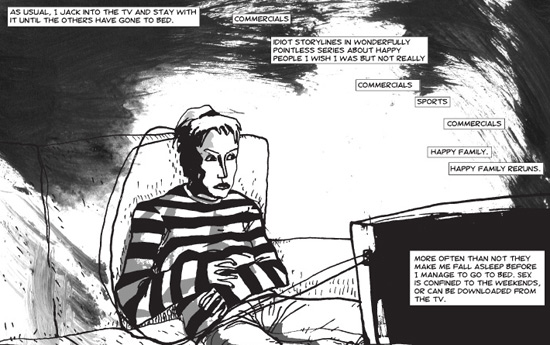
Television in my cyberpunk postapocalypse is a bit exaggerated. In the City, people don’t just watch TV, they jack into it through their TV ports, with cables going directly from the TV into their brains. Indoctrination taken to a whole new level. So the TV transmissions in the comic symbolises more than the role of the actual television in our world. When they cut the transmissions in the comic, it means that they cut the entire means of distribution for the entire machinery of cultural mainstreamification (is that a word? It should be).
Which is what makes it so dangerous. As dangerous as it seems to be to squat a building in sweden, for some reason. And the authorities treat it in much the same way too, with extreme prejudice (re: Piracy is Liberation 006: Violence).
So, another paraphrase:
Death to Television! Long live the new flesh!
Piracy is Liberation and the acting collective.
We live in a society that is very much based on the individual, but a lot of what happens, especially when it comes to events with the potential to change things, are happening on a collective level. It’s all about mass movements (which is probably why the current culture is so centered on the individual, because it makes the status quo easier to maintain).
So another thing I’m trying to do with Piracy is Liberation is to tell the story from a slightly different perspective. Of course, it’s very much about individuals. As a reader, you need characters to relate to in order for the story to work. But my characters are also parts of a greater collective. A collective that may not be visible as such at alla times, but one that is always present. When major changes take place, individual characters may be acting as catalysts, but there is always a collective that makes the real difference.
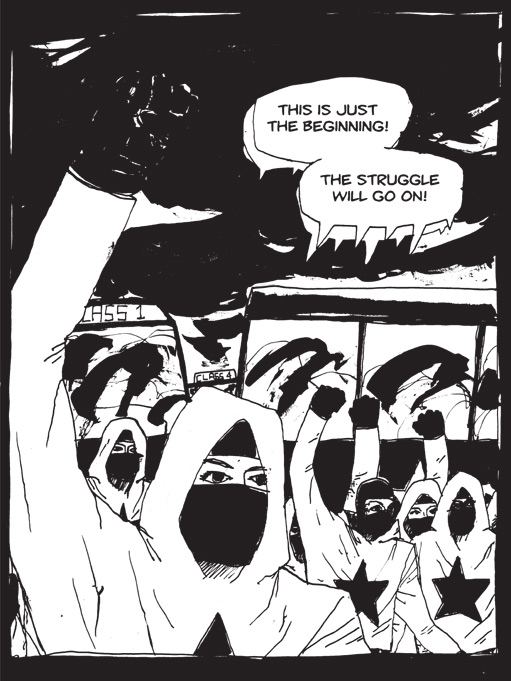
This is something that may not be obvious, but I want it to run in the background, surfacing now and then in the climaxes as seen through the eyes of the individuals taking part in the movements of the story. I’m also trying to convey the feeling of working as a collective. The feeling that anything can be achieved, in a way that I would say you’ll never feel on your own.
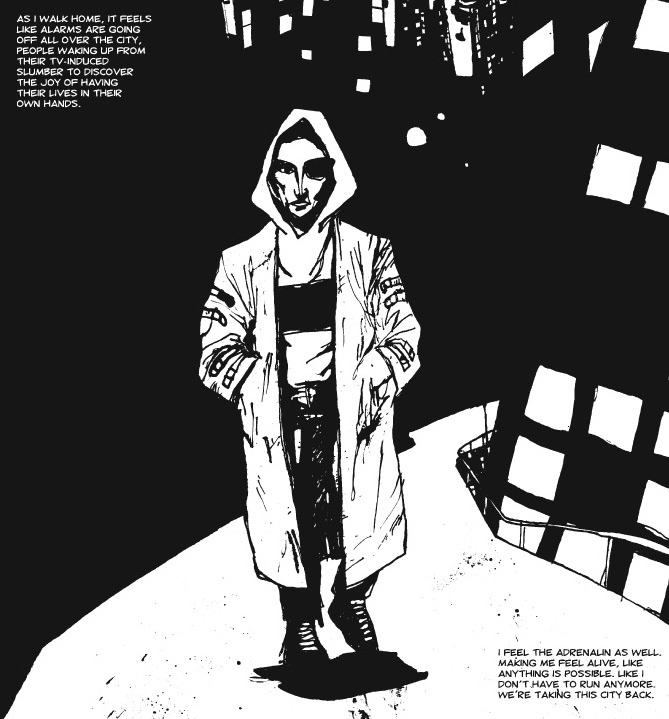
Piracy is Liberation and Feminism.
Ok, like this:
There were a lot of issues that I had to consider when I began turning Piracy is Liberation into what it is today. Things I thought I’d like to speak about in the series, but I think that some things can be spoken about by not speaking about them. War is one of those things (how does a world where the concept of war doesn’t exist differ from ours?) that I might go into later. Gender issues is another, and that is what I’d like to talk about now.
I was thinking, should I use Piracy to talk about gender issues that we all live with here today by having the Piracy world be similar to ours, or should I take another approach. I’ve never tried to market Piracy as a feminist comic, but I’ve heard from people who think it is, and I can understand why they think so. Of course, it was my intention, but I wasn’t sure people would notice it and I’m glad they did.
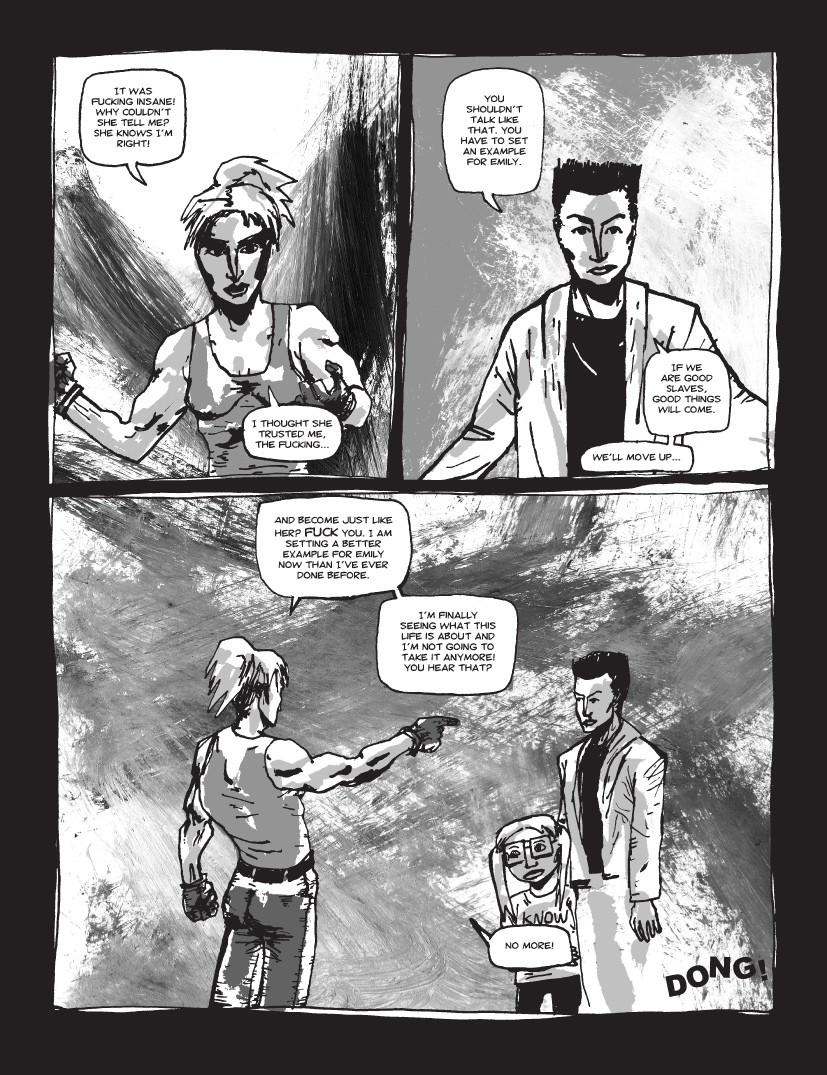
The thing is that there are a lot of stories, fictional and otherwise, that describe our gendered society and talk about inequalities and all that, but there are very few that show what things could be like without that shit. There are also some that turn the tables and present a world where men behave like women and women behave like men, but I’m not really interested in that either. I also have problems with drag sometimes, when it confirms stereotypes rather than question them. It doesn’t really change anything. Quite the opposite, almost.
So I present a world where men and women work under very similar conditions. They are able to do the same things, think the same thoughts, act on the same level. Because physical sex shouldn’t matter and gender (its mental/social counterpart) shouldn’t exist, and I wanted to see what would happen with my story if that was actually the case.
I still wanted the society in the City where the comic takes place to be hierarchical and conservative, but in other ways. It can be conservative when it comes to how we manage our relationships even if it’s gender equal. After all, relationships tend to be hierarchical in one way or another, no matter if they are heterosexual or homosexual, so I don’t think that heterosexuality or gender differences is a prerequisite for that.
After reading this, some may wonder why the opening phrase of the entire series is:
That’s it, stay still, bitch!
with a woman lying under the heel of a man’s boot, but the point in that scene is that the man is a policeman who could just as easily have been a woman. So it has more to do with power and violence and not so much to do with gender.
One final point I’d like to make is that the way I treat the subject in Piracy is Liberation, even though it’s pretty far from most other ficitonal stories produced in this society, is probably more similar to actual reality. Because the image we have of women as passive and men as the acting subjects throughout history can’t possibly be true. I thinks that’s simply another fictional story…
HackNight, July 11 2009
The description of my part of HackNight at Utkanten on Saturday:
I’ll be talking about the world of Piracy is Liberation, my cyberpunk postapocalypse series of graphic novels, where I got the idea for the original concept and how it progressed from there. By looking at the story and describing the City where it takes place, I hope to paint a picture of how the comic mirrors the reality of sweden in particular and capitalist society in general. I’d also like to talk a bit about how I’ve handled different story elements, like gender, media and collectivity/individuality when I’ve constructed this fictional world.
I may write something about any of these topics here on the blog during the week, if I’m not busy working on the new book.
In the meantime, here’s a color version of the first image made for Piracy is Liberation 007: Spiders pt. 1:
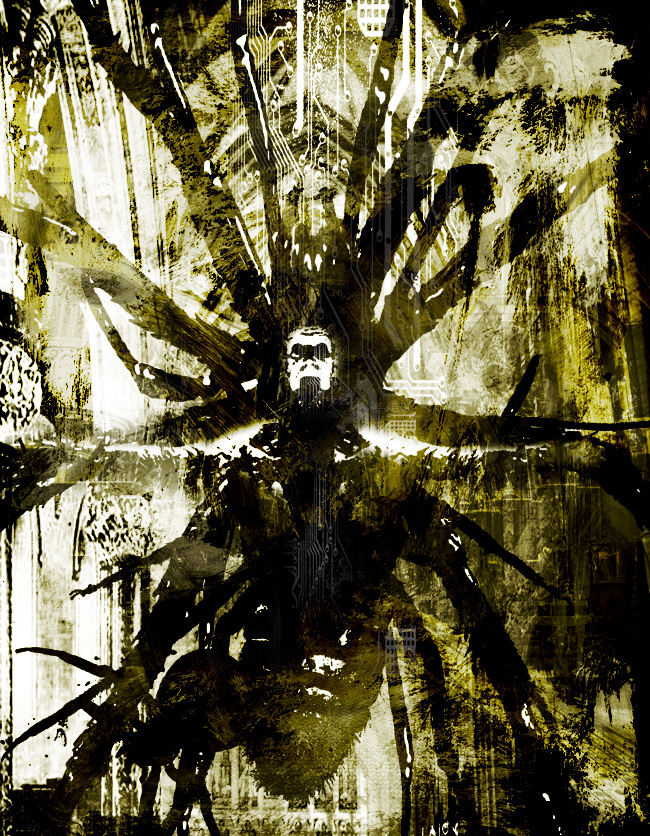
It is also a Wormgod image and will be available as a print at the upcoming Wall 001 exhibition (when and where that will be remains unknown, so check the site in the near future for more info as it comes).
Upcoming appearances…
Added some stuff to the world tour schedule:
July 11: Hacknight, Utkanten Malmö, Sweden
and
September 19: Wormgod: Zombies @ Malmö Queer Art & Film Festival, Panora, Malmö, Sweden
The first one is a hacker festival at Utkanten in Malmö, where I will talk a bit about Piracy is Liberation.
The second one will be some kind of talk about the Wormgod: ZOMBIES project, which is still very much in the future at this point, held by me and Suss. This will be in cinjunction with the showing of Bruce LaBruce’s film Otto or Up With Dead People, so we’ll probably talk a bit about that one too. More info about all this will come later at Panora‘s website.
And, of course, no one interested in Piracy is Liberation, Wormgod or extreme music should miss the party this Saturday at Utkanten!
See you there!
After Crack! 2009…
So. The Crack! report.
I can’t get rid of the question: “Why isn’t it always like this?” The Crack festival takes place at a squatted fortress in Rome and it’s the most creative and energetic comics festival I’ve ever been to. The organizers keep it open for (more or less) anyone who feel that they belong there to contribute and it’s more about creating exhibitions than just selling books.
This year I was there with Johan Jergner-Ekervik for CBK and we didn’t really know what to expect. We also had no time to prepare anything, what with the trip to New York and everything, so we simply brought books to sell and improvised an exhibition by sacrificing a copy of CBAvol7. Next time will be different. I’m sure CBK will be better prepared, and hopefully I’ll be able to come with Suss and make a Wormgod exhibition.
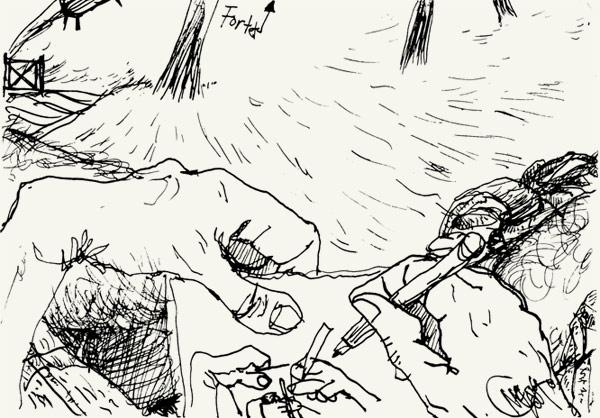
Anyway. While I was there, I got the feeling that this is how it should be done. Don’t get me wrong. I liked the MoCCA fextival and the others I go to, but they are all totally different from this. This is more like a music festval. You get up, sit in the grass for some hours with your breakfast beers and then everything starts at 18 and keeps going until late in the night, or sometimes the next day. Intoxicated people looking at art and comics. Loads of punk dogs. And good company from different places that aren’t sweden, which is always nice. Only setback was the lack of people speaking english (hence not being able to read our books). I always kind of interpret that as a sort of racism. An uninterest in being able to communicate with people outside your own language zone.
And so it got me thinking. Why isn’t it always like this? Why am I more and more losing interest in swedish comics culture, even as things are starting to change? And why is it that some interesting comics artists that I know here have lost interest in the medium, mainly because thay don’t feel at home in the dominant social culture of the swedish alternative comics scene? A scene where I’ve been hoping to have a home, but for some time now I’ve been losing that hope. Which may be just as well. I guess I’ll just have to move to Portugal or something.
Until then, I’ll settle for concentrating on Wormgod and Piracy is Liberation. Finding new audiences, doing new things. This morning I started planning for the Wormgod exhibition at next year’s Crack! festival. I look forward to it already.
And before the end of July I plan to have made another Piracy is Liberation book, a short comic for C’est Bon Anthology and at least one more image (after the one I’m working on right now) for an upcoming Wormgod exhibition (at Panora in August).
Happy Family of ultraViolence (Wormgod)
Working on the Wormgod exhibition for the Piracy is Liberation 006: Violence releaseparty at Utkanten, July 4…
This is a detail of my part of the new image and it will probably change a bit before we’re done, but I still thought it’d be nice to show…
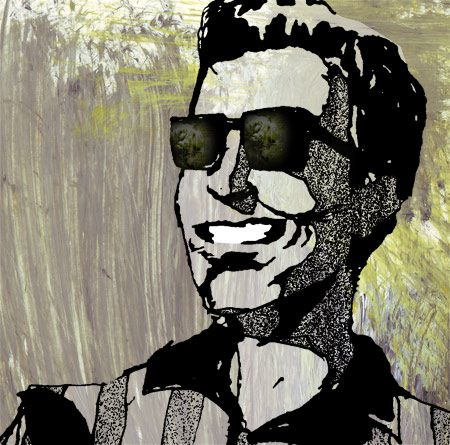
This will be the second Wormgod exhibition. It’s called Våld (Violence) and will be an expansion on the first one, Konsekvens.
Information about the release party can be found at the Piracy is Liberation website or on Facebook.

